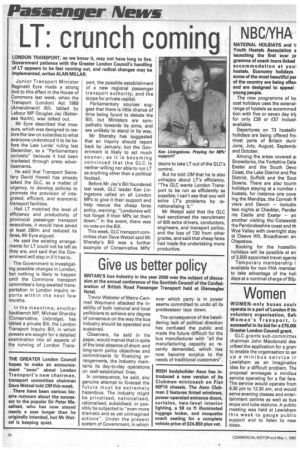LT: crunch coming
Page 12

If you've noticed an error in this article please click here to report it so we can fix it.
LONDON TRANSPORT, as we know it, may not have long to live. Government patience with the Greater London Council's handling of LT appears to be fast running out, and radical changes may be implemented, writes ALAN MILLAR.
Junior Transport Minister Reginald Eyre made a strong hint to this effect in the House of Commons last week, when the Transport (London) Act 1969 (Amendment) Bill, tabled by Labour MP Douglas Jay (Battersea North), was talked out.
Mr Eyre described that measure, which was designed to restore the law on subsidies to what everyone understood it to be before the Law Lords' ruling last December, as a "Parliamentary curiosity" because it had been marketed through press advertisements.
He said that Transport Secretary David Howell has already asked the GLC, as a matter of urgency, to develop policies to promote the provision of integrated, efficient, and economic transport facilities.
Had LT matched the level of efficiency and productivity of provincial passenger transport executives, it would have saved at least EBOm and reduced its fares, Mr Eyre argued.
He said the existing arrangements for LT could not be left as they are, and said that the Government will step in if it has to.
The Government is investigating possible changes in London, but nothing is likely to happen until the Commons transport committee's long-awaited transportation in London inquiry reports within the next few months.
In the meantime, another backbench MP, Michael Shersby (Conservative, Uxbridge), has tabled a private Bill, the London Transport Inquiry Bill, in which powers are sought for a detailed examination into all aspects of the running of London Trans
port, the possible establishment of a new regional passenger transport authority, and the scope for private capital.
Parliamentary sources suggest that there is little chance of time being found to debate the Bill, but Ministers are sympathetic towards its aims, and are unlikely to stand in its way.
Mr Shersby has suggested that an inquiry should report back by January, but the Government is likely to act much sooner, as it is becoming convinced that the GLC is neither willing nor able to run LT as anything other than a political football.
Before Mr Jay's Bill foundered last week, GLC leader Ken Livingstone called on all London MPs to give it their support and help rescue the cheap fares policy, warning: "Londoners will not forget if their MPs let them down." In the event, there was no vote on the Bill.
This week, GLC transport committee chair Dave Wetzel said Mr Shersby's Bill was a further example of Conservative MPs'
desire to take LT out of the GLC's control.
But he told CM that he is also unhappy about LT's efficiency. "The GLC wants London Transport to be run as efficiently as possible. I can't see that you will solve LT's problems by renationalising it."
Mr Wetzel said that the GLC had sanctioned the recruitment of 600 extra drivers, conductors, engineers, and transport police, and the loss of 720 from other grades, and said that cheap fares had made the undertaking more productive.




































































